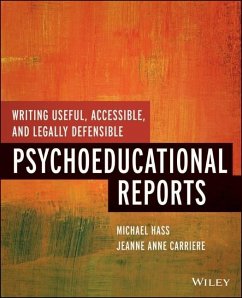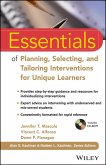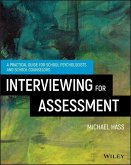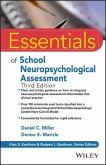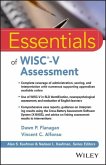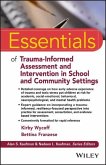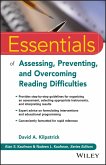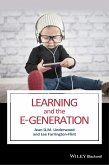This important new resource offers practical guidance on writing psychoeducational reports that directly respond to referral concerns. The authors provide recommendations and assessment information in a format easily understood by parents, teachers, and other educational and mental health professionals. Filled with numerous practice exercises, sample reports, helpful checklists, and end of chapter questions, this invaluable guide provides an approach to writing reports that will help school psychologists better meet the needs of the individualized education program (IEP) team, teachers, parents, and others working with the child.
"This book focuses on how to write a psychological report that is first and foremost helpful to consumers, while also being technically and legally defensible. Like the reports the authors describe, the book is carefully organized, beautifully written, and accessible to practitioners as well as graduate students. It is a brilliant accomplishment that should be required reading for every school psychologist."
--Brent Duncan, PhD, Professor of Psychology, Humboldt State University, Arcata CA
PRACTICAL GUIDANCE ON WRITING USEFUL, ACCESSIBLE, AND LEGALLY DEFENSIBLE PSYCHOEDUCATIONAL REPORTS
From clearly identifying reasons for referral to making recommendations based on assessment results, Writing Useful, Accessible, and Legally Defensible Psychoeducational Reports offers practical guidance for creating reports that enhance the understanding of children and their strengths and challenges in order to better meet their educational and functional needs.
The authors offer step-by-step guidelines for developing an assessment plan in a collaborative process with parents, teachers, and other professionals, choosing appropriate assessment and data collection tools, gathering relevant information, and providing clear and feasible individualized recommendations that directly respond to referral concerns in a format easily understood by parents and teachers.
Ideal for graduate students in school psychology, school psychologists, and other professionals in related fields who work with children in a school setting, Writing Useful, Accessible, and Legally Defensible Psychoeducational Reports:
Provides specific suggestions for increasing the usefulness and accessibility of reports including readability, positive phrasing, and vocabulary
Illustrates how to develop well-formed questions and how to choose assessment tools to answer referral questions
Reviews the legal mandates of report writing and discusses what must be included
Demonstrates how to accurately document and integrate data from record review, interviews, observations, and tests
Discusses how the use of the referral-based consultative assessment and report writing model can promote more active involvement in collaboration, prevention, and intervention
Features numerous real-world cases, helpful checklists, examples of question-driven referral reports, and a model interview protocol
"This book focuses on how to write a psychological report that is first and foremost helpful to consumers, while also being technically and legally defensible. Like the reports the authors describe, the book is carefully organized, beautifully written, and accessible to practitioners as well as graduate students. It is a brilliant accomplishment that should be required reading for every school psychologist."
--Brent Duncan, PhD, Professor of Psychology, Humboldt State University, Arcata CA
PRACTICAL GUIDANCE ON WRITING USEFUL, ACCESSIBLE, AND LEGALLY DEFENSIBLE PSYCHOEDUCATIONAL REPORTS
From clearly identifying reasons for referral to making recommendations based on assessment results, Writing Useful, Accessible, and Legally Defensible Psychoeducational Reports offers practical guidance for creating reports that enhance the understanding of children and their strengths and challenges in order to better meet their educational and functional needs.
The authors offer step-by-step guidelines for developing an assessment plan in a collaborative process with parents, teachers, and other professionals, choosing appropriate assessment and data collection tools, gathering relevant information, and providing clear and feasible individualized recommendations that directly respond to referral concerns in a format easily understood by parents and teachers.
Ideal for graduate students in school psychology, school psychologists, and other professionals in related fields who work with children in a school setting, Writing Useful, Accessible, and Legally Defensible Psychoeducational Reports:
Provides specific suggestions for increasing the usefulness and accessibility of reports including readability, positive phrasing, and vocabulary
Illustrates how to develop well-formed questions and how to choose assessment tools to answer referral questions
Reviews the legal mandates of report writing and discusses what must be included
Demonstrates how to accurately document and integrate data from record review, interviews, observations, and tests
Discusses how the use of the referral-based consultative assessment and report writing model can promote more active involvement in collaboration, prevention, and intervention
Features numerous real-world cases, helpful checklists, examples of question-driven referral reports, and a model interview protocol
This book focuses on how to write a psychological report that is first and foremost helpful to consumers, while also being technically and legally defensible. Like the reports the authors describe, the book is carefully organized, beautifully written, and accessible to practitioners as well as graduate students. It is a brilliant accomplishment that should be required reading for every school psychologist.
--Brent Duncan, PhD, Professor of Psychology, Humboldt State University, Arcata, C
--Brent Duncan, PhD, Professor of Psychology, Humboldt State University, Arcata, C

